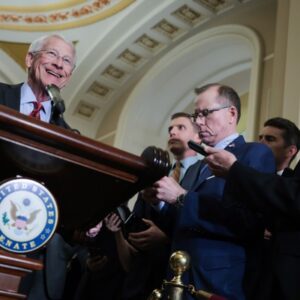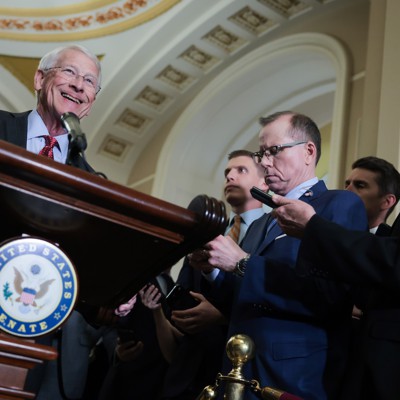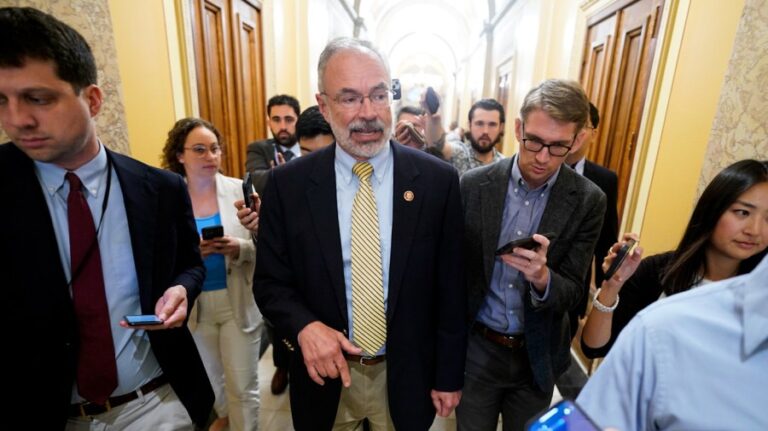House GOP leadership is counting on the White House to bear the brunt of the effort to sway hard-line members of the House Freedom Caucus who are threatening to vote against the Republican megabill. The legislation, which has already passed the Senate, is facing resistance from conservatives concerned about its potential impact on the national deficit.
According to estimates from the Freedom Caucus, the Senate-passed version of the bill could add more than $600 billion to the deficit, a figure that starkly contrasts with the bill they supported in May. This discrepancy has caused significant tension within the party, as the Senate version appears to violate a House budget framework negotiated with Speaker Mike Johnson. This framework links tax cuts to spending cuts, an equation that the current bill disrupts.
White House Intervention
Speaker Mike Johnson is in a delicate position. His strategy involves passing the Senate bill intact to avoid further delays that would occur if the bill were sent back to the Senate. As a result, the White House is seen as a crucial player in negotiating with the Freedom Caucus. The administration is expected to discuss potential executive orders and future legislation that might address the conservatives’ concerns.
“The sense is the White House needs to deliver the Freedom Caucus — that’s the project of the day,” said a person close to the GOP leadership, who requested anonymity to discuss internal strategies. The White House’s involvement underscores the complexity and high stakes of the legislative process, as it navigates between different factions within the Republican Party.
Moderates Express Concerns
Meanwhile, a separate group of GOP moderates from states like Pennsylvania, New York, and North Carolina have voiced their concerns about the bill’s implications for Medicaid. They are particularly worried about stringent cuts to state provider taxes that fund the program, which could affect healthcare services for vulnerable populations.
On Wednesday morning, these moderates met with President Donald Trump at the White House to discuss their concerns. The meeting highlights the balancing act required to maintain party unity while addressing the diverse priorities of its members.
Moderates in battleground districts, including Reps. Jen Kiggans (R-Va.) and Rob Bresnahan (R-Pa), wrote a letter to Johnson and Senate Majority Leader John Thune expressing concerns about the Medicaid cuts in late June.
Reps. David Valadao (R-Calif.) and Dan Newhouse (R-Wash.), who signed the letter, declined to comment on the Medicaid cuts when approached by reporters at the Capitol.
Historical Context and Implications
The current situation is reminiscent of previous legislative battles where party leaders had to navigate internal divisions to pass significant bills. The Affordable Care Act and the Tax Cuts and Jobs Act are examples where similar dynamics played out, requiring intricate negotiations and strategic concessions.
Experts suggest that the outcome of this legislative effort could have far-reaching implications. Should the White House successfully mediate between the factions, it could set a precedent for future collaborations on contentious issues. Conversely, failure to pass the bill could exacerbate divisions within the party, affecting its legislative agenda and electoral prospects.
Looking Ahead
The coming days will be crucial as GOP leaders and the White House work to align their strategies and secure the necessary votes. The outcome will not only impact the immediate legislative landscape but also shape the party’s approach to governance and policy-making in the lead-up to the next election cycle.
As negotiations continue, the political landscape remains fluid, with both moderates and conservatives keenly aware of the stakes involved. The ability of the GOP to present a united front on this megabill could influence its credibility and effectiveness in addressing the nation’s fiscal challenges.
























